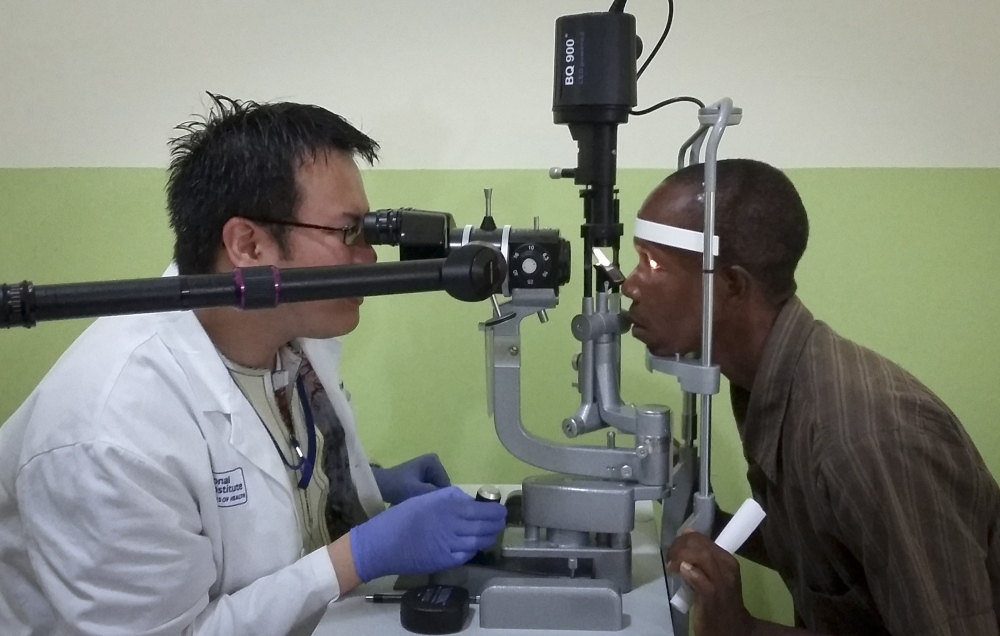DAKAR, Senegal — Lingering health problems afflicting many of the roughly 13,000 Ebola survivors have galvanized global and local health officials to find out how widespread the ailments are and how to remedy them.
The World Health Organization calls it an emergency within an emergency. Many survivors have vision and hearing issues. Others experience physical and emotional pains, fatigue and other problems.
The medical community is negotiating uncharted waters as it tries to measure the scale of this problem that comes on the tail end of the biggest Ebola outbreak in history.
“If we can find out this kind of information, hopefully we can help other Ebola survivors in the future,” said Dr. Ian Yeung, an eye specialist involved in a study of health problems in survivors in Liberia.
About 7,500 people will enroll – 1,500 Ebola survivors and 6,000 of their close contacts – and will be monitored over a five-year period in the study launched by Partnership for Research on Ebola Vaccines in Liberia, or PREVAIL.
Only about 40 percent of those infected have survived Ebola, according to WHO estimates. But while the survivors beat the odds, preliminary research shows that many are still suffering.
Around half of those who received post-recovery check-ups have joint pain, said Dr. Daniel Bausch, an Ebola expert and consultant for WHO.
“We don’t have the capacity yet – we wish we did – to follow every survivor,” he said. Consequently, the percentage of survivors who have complications isn’t known, he said.
He described the joint pain as “very debilitating and a very serious problem that can prevent people from going back to work and providing for their family.”
Some degree of change in vision has been reported by roughly 25 percent of the survivors who have been seen by medics, he said, including severe inflammation of the eye that if untreated can result in blindness, he said. The Ebola virus has been found, in at least a few cases, to linger in the eyes, though experts say it is not transmitted through tears.
Morris Kallon, 34, a health worker who survived Ebola in a village in Liberia’s Grand Cape Mount County, said he had fevers, headaches, lower abdominal pain and red eyes after he returned home.
“I have been experiencing a whole lot of problems within my body system,” he said. “I still feel pains in my back. It is very difficult for me to swing my arms. … My vision is always blurred, like dew on my face.”
Lab technician Mohamed SK Sesay was working at a hospital in Kenema, a town in eastern Sierra Leone, testing blood samples for Ebola when he fell sick with the virus. About eight members of his team got infected and he was among the few survivors, WHO said.
After he recovered, he was discharged from an Ebola treatment unit in September. He was still weak, and says he was shunned by his community.
Then his health deteriorated.
“Sleepless nights. Joint pain. Muscle pain,” he said. “I started experiencing loss of weight. … Loss of sight was the worst one that set me off. I used to cry. I couldn’t see my computer.”
He was attended to by one of Sierra Leone’s few eye doctors and his health improved overall, but he still has bad days.
“My biggest challenge is now my health,” he said.
He loses vision from time to time. Sometimes if people call out to him on the street, he can’t hear them.
Eye problems were noted in some survivors of Ebola outbreaks in Congo in 1995, in Uganda’s Gulu district in 2000 and in Uganda’s Bundibugyo district in 2007. But with such small numbers, past outbreaks haven’t provided sufficient opportunities for extensive study, Bausch said.
Now, with thousands of survivors, doctors want to learn why people are experiencing these ailments, how they affect the body, what percentage of survivors have issues and how to treat them.
Experts also want to learn whether the physical problems are directly caused by the virus, whether they existed before, are side-effects or perhaps autoimmune reactions, Bausch said.
“It’s too early … to know what the direct effect or link is to Ebola, if at all,” Bausch said.
In early August, WHO gathered experts in Sierra Leone who concluded that more needs to be done to provide better care plans for survivors, and more research and specialist help are needed.
The epidemic, which has claimed nearly 11,300 lives, has significantly slowed, with only three confirmed cases emerging in the last weekly reporting period, according to WHO figures.
But experts and survivors say the struggle to deal with the residual damage is just starting.
Send questions/comments to the editors.



Success. Please wait for the page to reload. If the page does not reload within 5 seconds, please refresh the page.
Enter your email and password to access comments.
Hi, to comment on stories you must . This profile is in addition to your subscription and website login.
Already have a commenting profile? .
Invalid username/password.
Please check your email to confirm and complete your registration.
Only subscribers are eligible to post comments. Please subscribe or login first for digital access. Here’s why.
Use the form below to reset your password. When you've submitted your account email, we will send an email with a reset code.